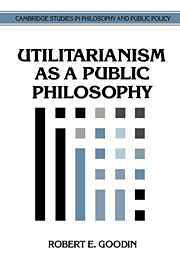Book contents
- Frontmatter
- Contents
- Preface
- Acknowledgments
- PART I INTRODUCTION: MORAL BASES OF STATE ACTION
- PART II MORALITY, PUBLIC AND PRIVATE
- PART III SHAPING PRIVATE CONDUCT
- PART IV SHAPING PUBLIC POLICIES
- 8 Liberalism and the best-judge principle
- 9 Laundering preferences
- 10 Heroic measures and false hopes
- 11 Theories of compensation
- 12 Stabilizing expectations
- 13 Compensation and redistribution
- 14 Basic income
- 15 Relative needs
- 16 What is so special about our fellow countrymen?
- 17 Nuclear disarmament as a moral certainty
- 18 International ethics and the environmental crisis
- References
- Name index
8 - Liberalism and the best-judge principle
Published online by Cambridge University Press: 28 January 2010
- Frontmatter
- Contents
- Preface
- Acknowledgments
- PART I INTRODUCTION: MORAL BASES OF STATE ACTION
- PART II MORALITY, PUBLIC AND PRIVATE
- PART III SHAPING PRIVATE CONDUCT
- PART IV SHAPING PUBLIC POLICIES
- 8 Liberalism and the best-judge principle
- 9 Laundering preferences
- 10 Heroic measures and false hopes
- 11 Theories of compensation
- 12 Stabilizing expectations
- 13 Compensation and redistribution
- 14 Basic income
- 15 Relative needs
- 16 What is so special about our fellow countrymen?
- 17 Nuclear disarmament as a moral certainty
- 18 International ethics and the environmental crisis
- References
- Name index
Summary
Utilitarianism, in its various forms, is an essentially preference-respecting, want-regarding morality. In its insistent refusal to brook any perfectionist notion of The Good which is good independently of anyone ever thinking it to be good, utilitarianism just echoes the more general Enlightenment liberalism from which it sprang. Arguably the defining feature of modern liberalism is its value-neutrality, its agnosticism as regards matters of ultimate personal value. In liberalism more generally, as in utilitarianism more narrowly, each individual is deemed to be the “best” (indeed, ultimately the “only true”) judge of his own interests.
That claim can be construed in various different ways, however, depending on whether we talk about what people actually do or sometime will or counterfactually would want. Therein lies the core of the controversy between liberal utilitarianism and its liberallibertarian cousins. Libertarianism is a radically antipaternalistic doctrine, taking whatever preferences people presently express as absolutely veridical. At root, utilitarianism is equally respectful of people's preferences. Utilitarians, however, are more sensitive to nuances within people's preferences and are more sensitive, in consequence, to possibilities for finding some warrant in people's own preferences for overriding some of the preferences they presently express.
What is at dispute between interventionist utilitarians and laissezfaire libertarians is, thus, merely the sense in which people ought to be said to be the best judges of their own interests. In this chapter, I identify four versions of the best-judge argument.
- Type
- Chapter
- Information
- Utilitarianism as a Public Philosophy , pp. 117 - 131Publisher: Cambridge University PressPrint publication year: 1995
- 1
- Cited by

